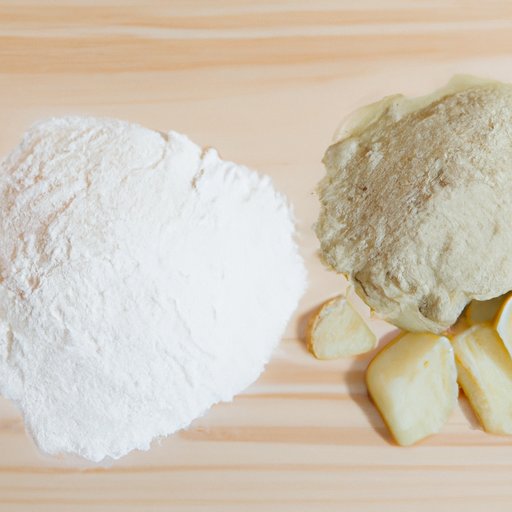
Is Potato Flour Gluten-Free?
For those following a gluten-free diet, finding safe alternatives to wheat-based flours can be a challenge. Potato flour is a lesser-known option that many people wonder if it is a safe alternative. In this article, we’ll take a closer look at potato flour, what makes it gluten-free, how to use it in your kitchen, and the benefits it offers.
Going Gluten-Free: The Lowdown on Potato Flour
First, let’s define what gluten-free means. Gluten is a protein found in wheat, barley, and rye, and can be harmful to those with celiac disease, gluten intolerance, or gluten sensitivity. Gluten-free means that a food or ingredient does not contain any gluten proteins.
Potato flour is naturally gluten-free, making it an excellent alternative for those with gluten-related issues. Potato flour is made from dehydrated potatoes, peeled, cooked, and ground into a fine flour. This unique process gives potato flour distinct properties that make it perfect for gluten-free diets.
Compared to other gluten-free flours such as rice flour or almond flour, potato flour has a higher starch content, which works well as a thickener in both sweet and savory dishes. Additionally, potato flour has a neutral flavor, making it a suitable and versatile choice for many recipes.
One prominent benefit of using potato flour in cooking and baking is the texture it offers. When combined with other gluten-free flours like rice flour or cornstarch, potato flour can provide a light and fluffy texture, making it suitable for cakes, bread, and other baked goods.
Baking With Potato Flour: A Gluten-Free Alternative
Potato flour can be a valuable ingredient in gluten-free baking, where finding the right texture and moisture is essential. Here are some tips when using potato flour in baking:
- Use potato flour in conjunction with other gluten-free flours like rice flour, cornstarch, or tapioca flour.
- Due to its higher starch content, potato flour can be denser than wheat flour, so a combination of flours works best.
- Use potato flour sparingly if making savory dishes as it has a strong potato flavor.
- For a lighter texture, mix potato flour with baking powder or baking soda to help the dough rise.
Here are some recipes using potato flour:
- Gluten-Free Chocolate Cake: combine potato flour with cocoa powder, sugar, baking powder, and eggs for a decadent chocolate cake.
- Gluten-Free Pizza Crust: mix potato flour with tapioca starch, yeast, sugar, and salt for a chewy pizza crust.
- Gluten-Free Banana Bread: incorporate potato flour into your banana bread recipe for added moisture and texture.
When compared to other gluten-free flours in baking, potato flour’s high starch content makes it a versatile and useful option for achieving the right texture in baked goods.
The Science of Potato Flour: How It’s Made Gluten-Free
The process of making potato flour is quite simple and involves peeling, cooking, and dehydrating potatoes, followed by grinding them into flour. The process of making it gluten-free involves removing the gluten by thoroughly washing the potatoes to remove any traces of gluten-containing starch.
Numerous studies report potatoes’ nutritional value, including having high levels of potassium and Vitamin C. Furthermore, potatoes contain dietary fiber, making them beneficial for digestive health.
When it comes to cooking and baking, potato flour offers numerous benefits. It is an excellent thickener for sauces, gravies, fillings, and stews. Also, potato flour can be utilized in savory dishes such as soups and casseroles, giving them a hearty texture.
Exploring Creative Ways to Use Potato Flour as a Gluten-Free Option
Aside from baking, potato flour also has several non-baking uses. Here are a few ideas:
- Use potato flour as a gluten-free thickener in sauces and gravies.
- Mix potato flour with a little water to make a paste and thicken soups and stews.
- Use potato flour as a coating for fried chicken or fish for added crunchiness.
- Add potato flour to meatballs or burgers for added moisture.
Additionally, potato flour can be used to thicken smoothies and shakes and as a binder in egg-free recipes, such as vegan burgers.
Potato Flour: The Simple Gluten-Free Ingredient You’ve Been Overlooking
Potato flour is an under-appreciated, yet versatile flour that can be utilized in gluten-free cooking and baking. Compared to other gluten-free options on the market, such as rice flour, potato flour’s neutral flavor and higher starch content make it an excellent choice for achieving the right texture in baked goods.
Potato flour has many unique properties and benefits, such as being a great thickener in non-baking recipes and producing a light and fluffy texture in baked goods. Plus, potato flour offers additional nutritional benefits, such as high potassium and Vitamin C levels.
Conclusion
Potato flour is a valuable ingredient to consider for those following a gluten-free diet. Its neutral flavor, high starch content, and unique properties make it an excellent alternative to other gluten-free flours. Whether used in baking or non-baking recipes, potato flour can elevate your food’s texture and flavor.




